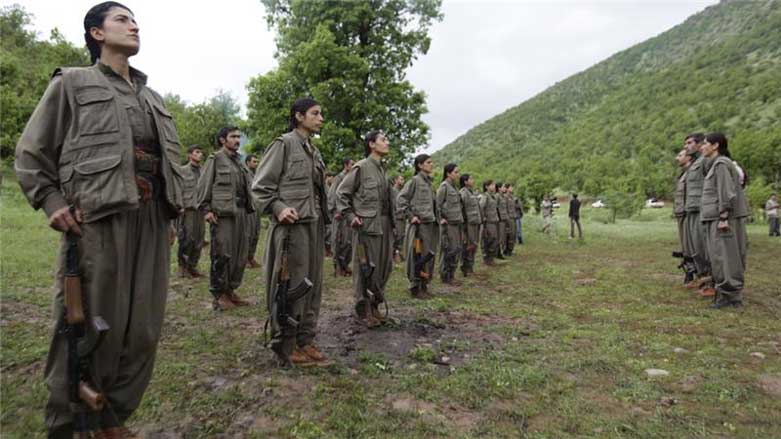Grim forecasts for Syria and Turkey

WASHINGTON, United States (Kurdistan24) – Last week, the Bipartisan Policy Center (BPC) hosted a panel entitled, “US Policy toward Syria, Turkey, and the Kurds.” The audience fully filled the room, underscoring how much Washington is now focused on this region and the challenges it presents.
The panelists offered dim views for the future in both Syria and Turkey. Eric Edelman, the former US ambassador to Turkey, described the situation most starkly, suggesting that Ankara’s conflict with the Kurdistan Workers’ Party (PKK) had placed Turkey “on the cusp” of civil war.
That, indeed, is the theme of a recent BPC report, “Authoritarianism and Escalation: Preparing for the Worst in Turkey’s Resurgent Kurdish Conflict.”
Edelman, the BPC report, as well as other panelists all affirmed that the basic cause of Turkey’s renewed Kurdish conflict is the ambition of President Recep Tayyip Erdogan to establish an “executive presidency,” which Edelman described as a “disguise” for one man rule.
The panel also blamed the PKK for the renewed fighting. Erdogan had an objective in picking a fight: to mobilize support among Turks for his political program. In significant part, his strategy has worked. But what was the PKK’s objective, as it responded forcefully to Erdogan’s provocations, contributing its part to reigniting the conflict?
Amberin Zaman, a Turkish journalist who has focused on minority rights in Turkey, asked that question, stating, “I still don’t know” what the PKK’s strategy is. The PKK “had the chance to retain the moral high ground,” she complained, but instead it “played along.”
Zaman described the PKK’s decision as a “huge missed opportunity,” particularly as the fighting resumed at a time when international public opinion had grown sympathetic to the organization and Washington was even discussing removing it from the official US list of terrorist groups.
One can easily miss the drama and severity of events, when they are happening some 6,000 miles away. Also, people tend to see the future merely as an extension of the past. Despite the great impact that US policy (or lack thereof) has had in Syria, that outlook characterizes the US attitude toward Syria’s civil war
Edelman reminded the audience of the extraordinary severity of that crisis. It is one of the biggest conflicts since World War II. When the number of fatalities reached 300,000, the UN stopped counting them. Syrians represent the largest displaced population since World War II and now “threaten to overwhelm” European institutions intended to handle migration and refugees.
Edelman suggested that it is unlikely that the region will look remotely like “the order we used to know” in the future. However, Washington has no policy to shape that future, he said.
In that vacuum lies opportunity. More than most peoples, Kurds understand, or should understand, that opportunities for major change occur only infrequently. Sykes-Picot set the boundaries for the Middle East—and denied Kurds a state—for 100 years. Now, Sykes-Picot is dying, and the opportunity for change exists. But only one party in Turkey or Syria seems to be acting in such a way as to seize the opportunity: Syria’s Kurds.
Their actions bear some similarity to the Kurds of Iraq, where one strong argument for independence is that the Kurdistan Regional Government is more effective than the government in Baghdad and more oriented toward the West and its values.
A representative of the Rojava administration in the audience claimed that the administration of the Kurdish cantons was superior to that in other parts of Syria. She got no quarrel from the panelists. They agreed with her.
Indeed, in some respects, Rojava’s governance compares favorably with Baghdad’s. That, at least, is the view of Ceng Sagnic, a Kurd from Turkey, who earned his undergraduate degree at the University of Kurdistan-Hawler in the Kurdistan Region, before taking up graduate study at Tel Aviv University.
Sagnic said that the Rojava cantons were better administered than those parts of Iraq that the Iraqi Army had liberated from the Islamic State.
However, the panel also pointed out the limits of the Democratic Union Party’s (PYD) rule in Syria. All the Kurdish cantons cannot be united, without slicing through Arab-inhabited territory. Moreover, the PYD is closely tied to the PKK. If the PKK is setting off bombs in Ankara, it will invariably have a negative impact on how Western countries deal with the PYD. Finally, as Sagnic noted, the PYD has excluded the Kurdish National Council (KNC), although the KNC represents a “considerable” part of Syria’s Kurdish society.
None of this provides much ground for optimism. However, as Edelman told Kurdistan24 afterwards, “Kurds will play a much bigger role” in the region’s future, no matter what happens.
Laurie Ann Mylroie, Ph.D., taught at Harvard University and the US Naval War College. Most recently, she served as a cultural advisor to the US military in Afghanistan.
Editing by Delovan Barwari
